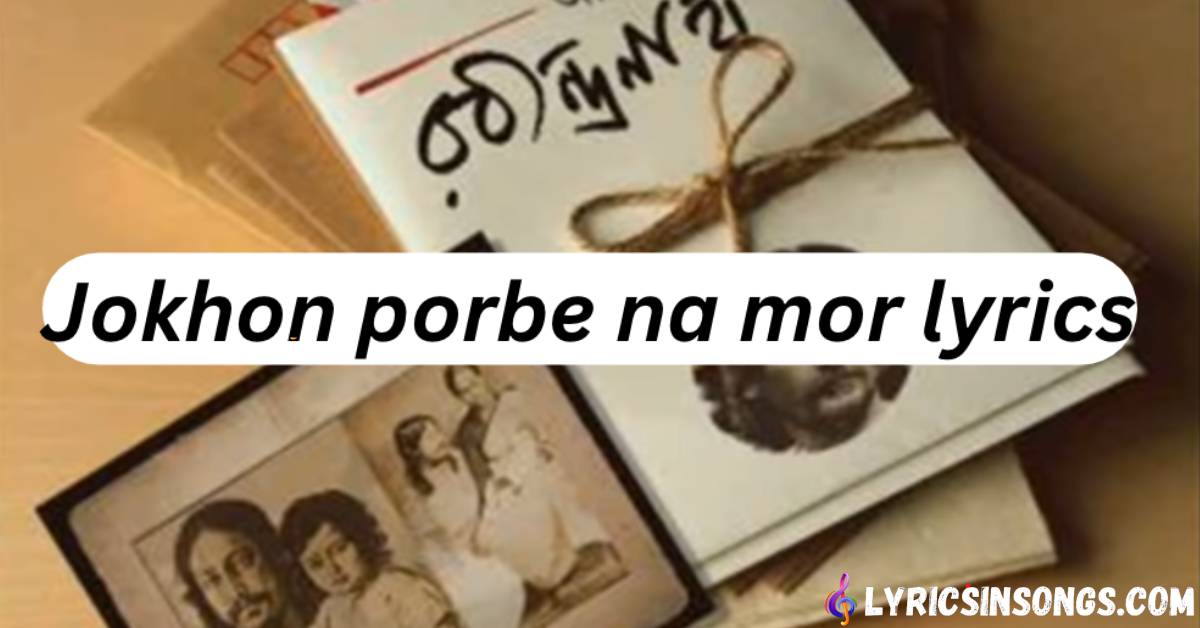Jakhon Porbe Na Mor Lyrics (যখন পড়বে না মোর পায়ের চিহ্ন) | Rabindra Sangeet

Jokhon Porbe Na Mor Lyrics
যখন পড়বে না মোর পায়ের চিহ্ন এই বাটে,
আমি বাইব না
আমি বাইব না মোর খেয়ারতরী এই ঘাটে,
যখন পড়বে না মোর পায়ের চিহ্ন এই বাটে।
চুকিয়ে দেব বেচা কেনা,
মিটিয়ে দেব গো,
মিটিয়ে দেব লেনা দেনা,
বন্ধ হবে আনাগোনা এই হাটে।
তখন আমায় নাইবা মনে রাখলে,
তারার পানে চেয়ে চেয়ে
নাই বা আমায় ডাকলে।
যখন পড়বে না মোর পায়ের চিহ্ন এই বাটে।
যখন জমবে ধুলা তানপুরাটার তারগুলায়,
কাঁটালতা,
কাঁটালতা উঠবে ঘরের দ্বারগুলায়, আহা,
যখন জমবে ধুলা তানপুরাটার তারগুলায়
ফুলের বাগান,
ঘন ঘাসের পরবে সজ্জা বনবাসের,
শ্যাওলা এসে ঘিরবে দিঘির ধারগুলায়
তখন আমায় নাই বা মনে রাখলে,
তারার পানে চেয়ে চেয়ে
নাইবা আমায় ডাকলে।
যখন পড়বে না মোর পায়ের চিহ্ন এই বাটে।
তখন এমনি করে বাজবে বাঁশি এই নাটে,
কাটবে দিন কাটবে,
কাটবে গো দিন আজও যেমন দিন কাটে, আহা,
এমনি করে বাজবে বাঁশি এই নাটে
ঘাটে ঘাটে খেয়ার তরী
এমনি, এমনি সে দিন উঠবে ভরি
চরবে গোরু খেলবে রাখাল ঐ মাঠে।
তখন আমায় নাই বা মনে রাখলে,
তারার পানে চেয়ে চেয়ে
নাইবা আমায় ডাকলে।
যখন পড়বে না মোর পায়ের চিহ্ন এই বাটে।
তখন কে বলে গো সেই প্রভাতে নেই আমি
সকল খেলায়,
সকল খেলায় করব খেলা এই আমি - আহা,
কে বলে গো সেই প্রভাতে নেই আমি।
নতুন নামে ডাকবে মোরে বাঁধবে,
বাঁধবে নতুন বাহু-ডোরে,
আসব যাব চিরদিনের সেই আমি।
তখন আমায় নাইবা মনে রাখলে,
তারার পানে চেয়ে চেয়ে
নাই বা আমায় ডাকলে।
যখন পড়বে না মোর পায়ের চিহ্ন এই বাটে।
Meaning of the Jokhon Porbe Na Mor Song
The first few lines imply that the speaker won't come back to this planet until their footsteps are gone. They demonstrate a feeling of detachment from material things and a readiness to part with them without looking back. The speaker makes it clear that because it is part of life, they won't be sad or regret their departure. The song's lyrics emphasize the concept that everything in life has a limited lifespan and must ultimately expire. The speaker seems to be saying that they won't hold on to fleeting or useless things. Accepting that they would eventually degrade, individuals may choose to sell them or leave them alone.
The song also features natural sounds and images, like a flute, birds tweeting, and dust rising from the fields. These components imply that the speaker is aware of time's passing and the rhythms of nature. The song's lyrics stress the idea that life is short and that we should take advantage of the beauty around us. The song's message has touched generations of Bengali listeners since it touches on the universal themes of mortality and the transience of existence.
The song's lyrics express a profound sense of detachment from worldly belongings and a desire to let them go without looking back. The speaker acknowledges that they will eventually leave no trace behind and that they will not come back to this earth. The message of the song is to treasure the things in life that are genuinely essential to us while we still have them, such as relationships, love, and the natural environment. This song's influence goes beyond only its lyrics. The song's melody is entrancingly lovely and has grown to be one of Bengali music's most well-known pieces. Many bands and vocalists have sung the song, and its popularity has only risen over time.
About the Author of the Song
Jokhon porbe na mor song is a Rabindra Sangeet .Rabindranath Tagore wrote the lyrics to this song. Hemanta Mukherjee, Jayati Chakraborty, Lopamudra Mitra, Srabani Sen, Shivaji Chattopadhyay, Arundhati Holme Chowdhury, and several more artists all contribute to the song's vocal performance. Recently this song was used in the Bengali Movie Shah Jahan Regency and there the song was sung by Rupankar Bagchi.
The song has had a significant influence on Bengali literature and culture in addition to its musical and cultural value. In Bengali literature, the idea of distancing oneself from worldly belongings and acknowledging the transience of life is a recurrent topic. "Jokhon Porbe Na Mor Payer Chinho" is sometimes considered as a pivotal work that contributed to the popularization of this philosophy.
In conclusion, the song "Jokhon Porbe Na Mor Payer Chinho" is profoundly significant and has left a lasting impression on Bengali culture, music, and literature. Audiences are still receptive to its message of objectivity and acceptance of life's transience.
Film Title: Aalo
Artist: Arundhati Holme Chowdhury
Music Director: Rabindranath Tagore
Lyricist: Rabindranath Tagore
Filmstar: Kunal Mitra/Rituparna Sengupta/Abhishek Chatterjee
Director: Tarun Majumder
Label: Saregama India Ltd
These are some various versions and adaptations of his songs on platform like YouTube. These are some links off the songs that have been provided here :
